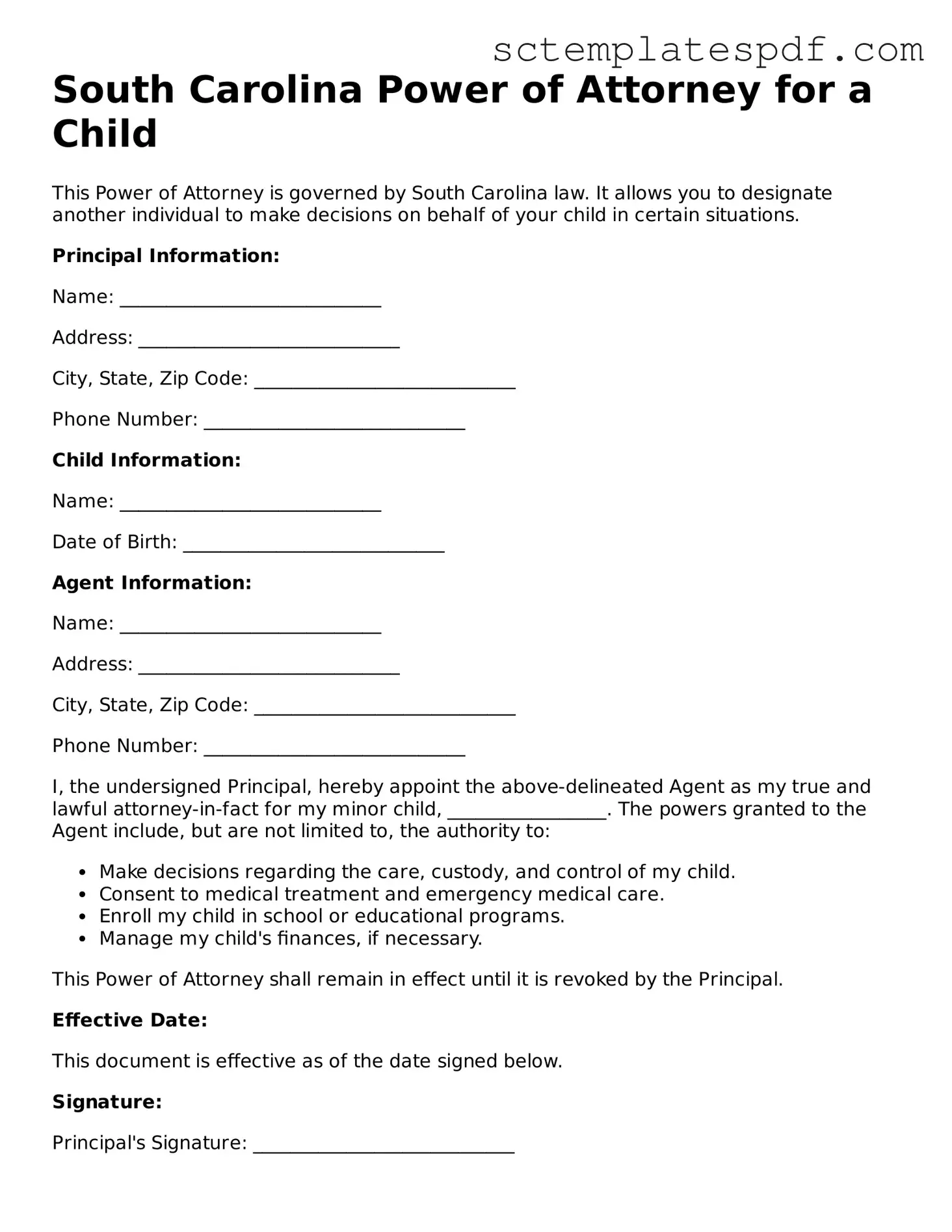Valid South Carolina Power of Attorney for a Child Document
In South Carolina, the Power of Attorney for a Child form serves as a crucial legal tool for parents and guardians who need to delegate authority for the care of a minor child. This form allows a designated individual, often a relative or trusted friend, to make important decisions regarding the child's welfare, education, and healthcare in the absence of the parents. It is particularly useful in situations such as temporary relocations, medical emergencies, or when parents are unable to fulfill their responsibilities due to work commitments or other obligations. The form outlines specific powers granted to the agent, which may include the ability to enroll the child in school, consent to medical treatment, and manage day-to-day activities. By clearly defining the scope of authority, the Power of Attorney for a Child helps to ensure that the child’s needs are met while providing peace of mind to parents. Understanding the requirements and implications of this document is essential for anyone considering its use, as it not only facilitates responsible caregiving but also protects the rights of all parties involved.
Key takeaways
Filling out and using the South Carolina Power of Attorney for a Child form can be a straightforward process, but it is essential to understand its key aspects. Here are some important takeaways to keep in mind:
- The form allows a parent or legal guardian to designate another adult to make decisions on behalf of their child.
- It is crucial to select a trustworthy individual, as they will have significant authority over the child's welfare.
- The Power of Attorney can be limited to specific activities, such as medical decisions or educational matters, or it can be more general.
- The form must be signed by the parent or guardian in the presence of a notary public to be legally binding.
- It is recommended to keep copies of the completed form accessible for all parties involved.
- This document does not terminate parental rights; it simply grants temporary authority to another adult.
- Parents should consider the duration of the Power of Attorney, as it can be set for a specific time frame or remain in effect until revoked.
- Review the form periodically to ensure it still meets the needs of the child and the designated adult.
Understanding these key points can help ensure that the Power of Attorney for a Child form serves its intended purpose effectively and responsibly.
Dos and Don'ts
When filling out the South Carolina Power of Attorney for a Child form, certain actions can ensure a smooth process, while others may lead to complications. Below is a list of what to do and what to avoid.
- Do ensure you have the correct form for the specific needs of your child.
- Do provide complete and accurate information about the child and the agent.
- Do sign the document in the presence of a notary public.
- Do keep copies of the signed document for your records.
- Don't leave any sections of the form blank; incomplete forms may be rejected.
- Don't use outdated versions of the form; always check for the latest version.
- Don't forget to specify the powers you are granting to the agent.
- Don't assume verbal agreements are sufficient; everything must be documented.
Guidelines on Utilizing South Carolina Power of Attorney for a Child
Filling out the South Carolina Power of Attorney for a Child form is a straightforward process that requires careful attention to detail. This form allows a parent or legal guardian to designate another adult to make decisions on behalf of their child. Once the form is completed, it should be signed and dated to ensure its validity.
- Begin by downloading the South Carolina Power of Attorney for a Child form from a reliable source or obtaining a physical copy from a legal office.
- At the top of the form, fill in the name of the child. Make sure to include the child's full name, date of birth, and any other identifying information requested.
- Next, enter your name as the parent or legal guardian. This section typically requires your full name and relationship to the child.
- Provide the name of the individual you are appointing as the attorney-in-fact. This person will have the authority to make decisions for your child.
- Fill in the contact information for the attorney-in-fact, including their address and phone number. This ensures that they can be reached easily in case of an emergency.
- Specify the duration of the power of attorney. Indicate whether it is for a specific period or until revoked. Be clear about the start and end dates, if applicable.
- Review the form for any additional sections that may require your attention, such as specific powers granted to the attorney-in-fact.
- Once all sections are completed, sign and date the form. Ensure that your signature matches the name you provided as the parent or guardian.
- Consider having the form notarized. While not always required, notarization can add an extra layer of authenticity.
- Make copies of the completed form for your records and provide copies to the attorney-in-fact and any relevant parties.
Other Popular South Carolina Forms
Sc Homeschool Laws - Acts as a safety net to ensure legal compliance in your education choices.
Gun Sale Bill of Sale - Helps buyers verify seller credentials if necessary.
For more information and to access necessary documents, you can visit Missouri PDF Forms which will guide you through the process of completing the Tractor Bill of Sale form accurately and efficiently.
Printable Sc Bill of Sale - A clear outline of the buyer's and seller's details during the transaction.
